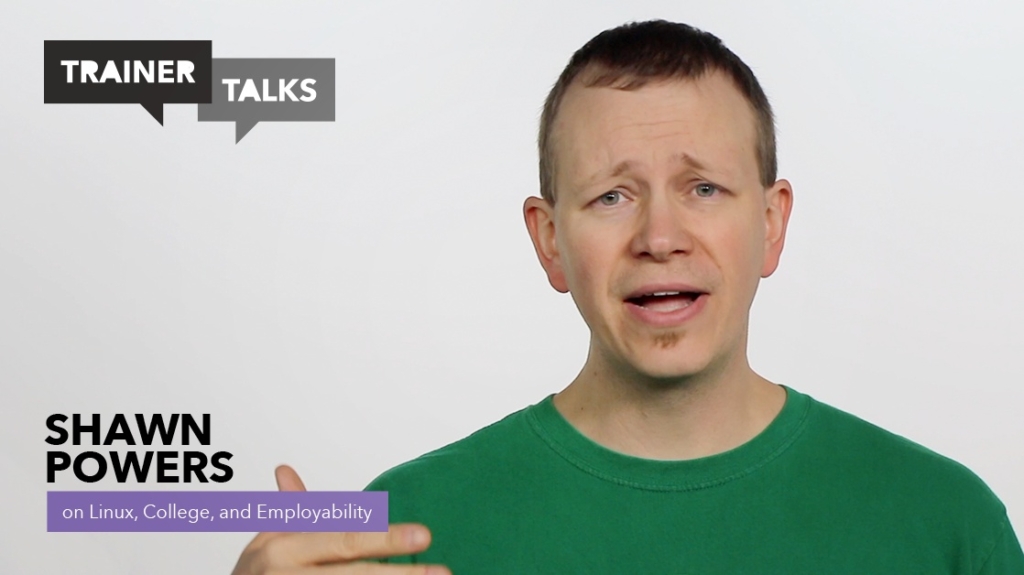Trainer Talks: Shawn Powers on Linux, College, and Employability

Shawn Powers has been busy this year. He has taken on a massive, 100-video Linux course, Ansible Essentials, and Android coding. Between creating tons of great training, he took some time to stand before a white screen to talk about his career, his love of Linux, and the things that will make someone employable in 2018 and beyond.
You can watch all the uncut Trainer Talks interviews on our YouTube playlist, which we update regularly with more advice and stories from your favorite CBT Nuggets trainers.
We often get questions from new IT pros, and this is one of the big ones. What would you tell someone with some experience about why certifications are valuable?
Certifications do two things. It can make you more employable if you're looking for a job, but it also allows you to be more employable internally.
If you've already got the experience, here's what you do. Start with the lower-level courses, but don't necessarily plod through every single video or module if it's something you know; great! Do a quick refresher, test yourself, and then get certified. Now, you have the certification, and you're giving yourself the confidence that "Yeah, I do know that topic."
Next, find a topic you love and proceed to the next step. (You can figure out the next step with any of the CBT Nuggets Roadmaps to Success.)
But don't get caught in the "I have 100 certifications" trap.
What trap is that? Don't you want to learn continually? That's kind of our thing at CBT Nuggets.
Sure, but think about what you really need to focus on. I only say don't be the perpetual certification test-taker when it's for the sake of the certification. Get out there and do something awesome, and then learn what can make you more awesome by doing more.
Certifications do look good on a resume, though, don't they?
I'd say this: Get certified so you're confident and employable, but then start doing something. Don't get certified to get a job; get certified to find the career you love. You can always get certified and learn more as you go because the skills you'll need will greatly vary based on your daily work.
Okay, now, what about the recent graduates? Is anyone else looking to get into the IT field without a degree?
That's a good question. So, you're fresh out of college and want to know where to go from there. There's an easy answer: Follow your passions.
If you don't know, then keep learning. You'll find it. Certifications are a way to make yourself more employable and to see and cement your skills so that you're more confident. You'll feel better about that job you want to go for, and eventually that career.
Last year, you finished the Linux LPI 201-400 and 202-400 courses. This year, you've got a massive Linux course coming out. What's the one thing about Linux you'd want people to know?
Linux is just not as scary and mysterious as everybody seems to think.
My biggest goal when I do Linux training is to peel back that mysticism and that scary covering. People get intimidated and say, "Oh, Linux is so complicated. It's just all green text on a black background." But it's not that bad. Once you start to learn, you know, it's just configuration or text files, and it's not that complicated.
Your new course is called Everything Linux. It's one of our biggest courses. Why did you want to tackle this?
There have been decades of system administrators who keep their knowledge to themselves. I'm not that guy. If you want to know about Linux, I want you to know and understand that it's not scary. It's not complex. You can get it, and it can change your life.
Switching gears a little. We all know you've got a unique, weird place in your heart for troubleshooting. What can you share about troubleshooting?
I love troubleshooting. Most of my career has been in system administration, and that's pretty much all about solving problems. I could do a whole course right now about troubleshooting.
Let's start with one thing. What's the single best advice you can give about troubleshooting?
Alright, here's the single best advice I can give you. When troubleshooting a problem, try to cut the entire gamut of what it could be in half.
So, if there's a problem connecting to a web server, it could be in my workstation or the server that's down.
First, make sure there's a connection between them. Can I ping the server? If you can ping that server, everything from my workstation to that server seems fine, so don't focus on your computer anymore. You've narrowed that problem down, so then onward to the server. Is this service running? Is this port open?
Keep cutting the problem down so you're focusing on a smaller and smaller area. Otherwise, it'll take forever to get to that point where it turns out your server is unplugged in the room down the hall.
Just cut the problem in half as often as you can. Work on a narrower and narrower problem.
A couple of other things from Shawn Powers
Shawn isn't just a troubleshooting and Linux nerd. He also tackles DevOps topics, including Puppet, Chef, and Docker for CBT Nuggets. In addition, he has produced several webinars on relevant tech topics over the years. Here are a few of them:
Linux For Mortals: How Shawn Got Into Linux
delivered to your inbox.
By submitting this form you agree to receive marketing emails from CBT Nuggets and that you have read, understood and are able to consent to our privacy policy.